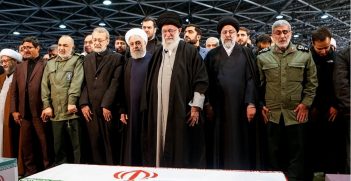Trouble Ahead: The China-Pakistan-India Triangle

The China-Pakistan strategic relationship is becoming increasingly important if China is to achieve its ambitions in the region. Much to India’s concern, the cooperation between China and Pakistan is set to increase – if Pakistan’s domestic troubles do not derail these efforts.
Pakistan’s leaders like to describe their relationship with China using a rather obsequious phrase: ‘higher than the mountains, deeper than the oceans, stronger than steel and sweeter than honey’. Although Chinese leaders are less gushing in their descriptions of the bilateral relationship, there is no denying that Pakistan is an important strategic partner of China. In fact, Pakistan is China’s only reliable ally at the moment because its other ally, North Korea, does not appear to heed China’s advice at present. Furthermore, Pakistan has gained a central role in China’s new regional strategy, although there are many obstacles to be overcome and there is no guarantee of success.
The China-Pakistan relationship has long been seen in India as driven by China’s desire to keep India hemmed in and to thwart its ambitions to play a greater role beyond the sub-continent. China is indeed the most important provider of military assistance to Pakistan, its key economic partner and, significantly, the source of nuclear technology for its weapons and power stations.
The growing strategic nexus between China and Pakistan is deeply worrying for India’s strategic planners. Both China and Pakistan have long-running territorial disputes with India and the Indian military has always prepared for the possibility of a two-front war: fending off Pakistan and China at the same time.
While Chinese officials routinely deny that their relationship with Pakistan is aimed against India, Pakistan’s military and civilian leaders see their ‘all-weather friendship’ with China as a source of comfort in their acrimonious relationship with India. Indian strategic commentators regularly point out the risks to India’s security arising from the presence of a large number of Chinese soldiers in the Pakistan-controlled part of Kashmir, where they are building roads and other civilian and military infrastructure.
There are now, however, indications that Pakistan has acquired an even more important position in China’s geo-political and geo-economic calculus. China’s new strategic moves reveal that Pakistan’s importance for China is moving beyond constraining India’s influence and keeping India on the edge.
Pakistan is now a key plank in Chinese President Xi Jinping’s much talked-about “One Belt, One Road” initiative. On a visit to Pakistan in April last year, Xi committed China to investing US$46 billion in 51 projects related to the China-Pakistan Economic Corridor (CPEC). These include a series of inter-connected roads, a railway network, oil pipelines and power projects that could make Pakistan the fulcrum of China’s ambitious strategy to reduce its reliance on US-policed sea lanes in the Malacca Strait.
Moreover, it could cut costs and significantly reduce the time it takes for oil from the Middle East to reach China’s energy-hungry cities and industrial centres. In November last year, China established a strategic position in the Indian Ocean via the Chinese-built and Chinese-operated Gwadar Port at the mouth of the Persian Gulf in Pakistan’s restless Balochistan province.
Additionally, the China-Pakistan Economic Corridor would contribute to China’s efforts to strengthen its presence in Afghanistan, where it is already a major investor, and Central Asia more generally. It would also assist China in more effectively tackling the threat arising from Uighur nationalists in its restive Xinjiang province. China has always demanded – and received – Pakistan’s fullest cooperation in dealing with Uighur nationalist groups who have carried out a growing number of militant attacks on targets within China.
Although the infrastructure projects that form part of the China-Pakistan Economic Corridor have the potential to transform Pakistan’s economy and give China a significant strategic advantage over the United States and India, the prospects of the CPEC ever fully realising its potential seem remote. This is for a number of reasons.
Pakistan’s abysmal internal security situation is the first challenge to China’s ambitious plans for the region. The country is already considered to be one of the most dangerous overseas locations for Chinese workers. While many details of the CPEC plan remain secret, the Chinese government has demanded that Pakistan provide adequate security to its personnel working on the related projects. Pakistan’s Army has created a special security division to provide protection to Chinese engineers and workers. There is also little doubt that Chinese military personnel will be actively involved in construction projects and in providing security for their own citizens.
But these measures may not be enough to guarantee the sustainability and economic viability of the projects. Until Pakistan is able to find some resolution to its internal ethnic and religious problems and civil-military relations, economic development and prosperity in its tribal provinces will remain elusive, even with China’s generous financial support. As a consequence, China’s ambitious regional strategy will become hostage to the internal divisions and dysfunction of Pakistani government and society.
There are also rumblings from within Pakistan’s troubled Balochistan and Khyber Pakhtunkhwa provinces, where leaders have denounced various aspects of the CPEC. Baloch nationalists fear further losing control over their natural resources and see the CPEC as a conspiracy to flood the province with migrants from other parts of Pakistan, making them a minority in their own homeland.
As for India, it has made its objections to the China-Pakistan Economic Corridor clear to the Chinese leadership: India’s foreign minister has described the plan as ‘unacceptable’ because it passes through Pakistan-occupied parts of Jammu and Kashmir.
Dr Pradeep Taneja specialises in Asian politics and international relations in the School of Social and Political Sciences at the University of Melbourne, where he is a Fellow of the Australia India Institute and an Associate of the Centre for Contemporary Chinese Studies. This article may be republished under a Creative Commons License.





